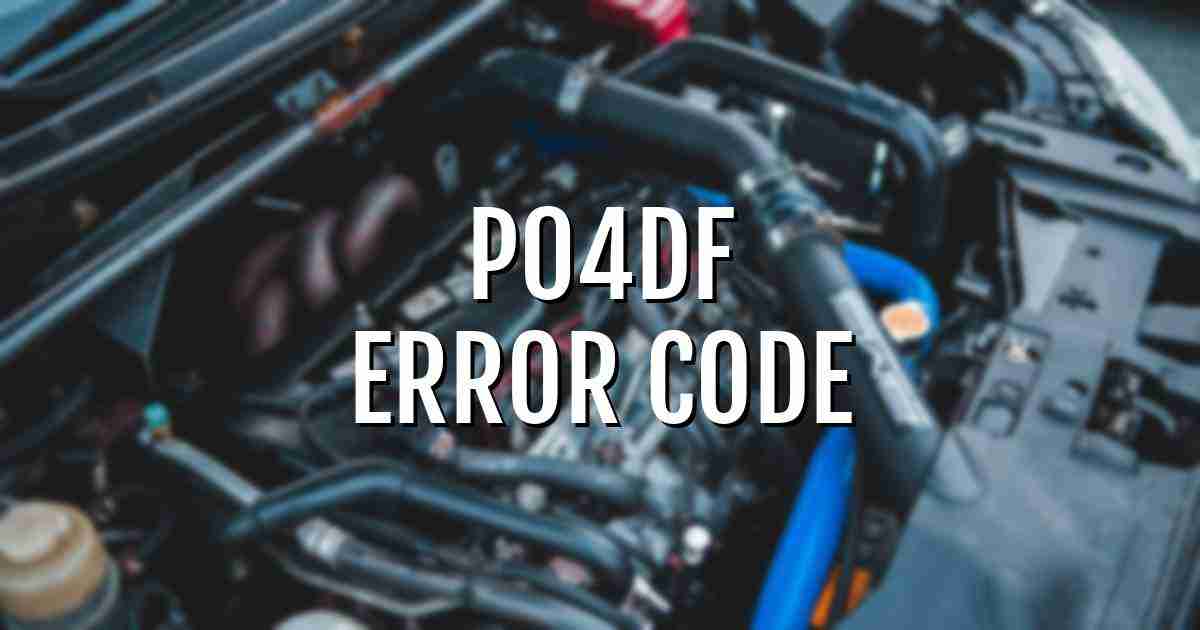The OBD code P04DF indicates a fault with the Evaporative Emission (EVAP) Canister Purge Valve.
Symptoms include the Engine Light being ON.
Common causes are a faulty purge valve, open/shorted harness, or poor electrical connection.
This issue is not severe but should be addressed promptly.
A possible fix is to inspect and repair any damaged components or wiring connections related to the EVAP Canister Purge Valve.
| Repair Importance Level | 10.0 (Out of 10) |
| Estimated Repair Time | Approximately 1.0 hour |
| Repair Difficulty Level | 10.0 (Out of 10) |
I know how frustrating it is to see that warning light pop up again and again. You don’t need to spend money at the mechanic just to clear it. With this pocket-friendly automatic car scanner, you can do it yourself in seconds and and avoid the time and inconvenience of driving to a mechanic. Just plug it in, connect to your Android or iOS phone, and instantly see live data. Understand the fault code, clear it right away, and decide if it’s something urgent or if you’re good to drive. It even monitors your car and sends notifications to your phone, so you’re always in control. Simple, fast, and stress-free—today’s offer price!
Symptoms of the p04df OBD Code
The vehicle may experience issues related to the exhaust gas recirculation temperature sensor circuit.
- Symptoms: Engine Light ON.
- Reduced engine power.
- Rough idle.
- Engine stalling.
- Turbocharger underboost condition.
Causes of the p04df OBD Code
Do you know you can clear most fault codes—but some could mean serious danger? Don’t take chances with your safety or your family’s safety. This budget-friendly car scanner makes it easy to clear fault codes in seconds while showing you exactly what’s wrong. Plug it in, connect to your Android or iOS phone, and instantly check live data. You’ll know if it’s a minor issue you can clear or something serious that needs attention—so you can drive safely and stress-free. (Today’s Deal)
Possible reasons for fault code P04DF include issues with the exhaust gas temperature sensor.
- P04DF can be caused by a faulty Evaporative Emission (EVAP) Canister Purge Valve.
- An open or shorted EVAP Canister Purge Valve harness.
- A poor electrical connection in the EVAP Canister Purge Valve circuit.
Fixing Error Code p04df Step By Step
To resolve fault code P04DF, inspect the crankcase ventilation system for leaks or restrictions.
- To fix OBDII code P04DF, start by reviewing the possible causes related to the Exhaust Gas Temperature Sensor Circuit.
- Visually inspect the wiring harness and connectors for any damage or corrosion.
- Check the connector pins for any signs of being broken, bent, pushed out, or corroded.
- Test the Exhaust Gas Temperature Sensor for proper operation and replace if necessary.
- Clear the fault code from the vehicle’s computer using a scan tool.
- Finally, perform a road test to ensure the code does not return, indicating a successful repair.
Cost Of Fixing p04df Fault Code
Diagnosing and repairing fault code P04DF typically involves inspecting and possibly replacing the crankcase ventilation heater.
The cost to diagnose and fix OBD code P04DF typically ranges from $75 to $150, based on an estimated repair time of 1. 0 hour.
Factors like shop rates and complexity of the repair can influence the final cost.
Details of the p04df OBD Code
P04DF code indicates a problem with the crankcase ventilation system pressure sensor circuit.
OBD code P04DF means that the powertrain control module (PCM) has detected a restriction in the exhaust gas recirculation (EGR) system.
This code is triggered when the PCM detects that the flow of exhaust gases through the EGR system is not within the expected range.
The EGR system is responsible for recirculating a portion of the engine’s exhaust gases back into the intake manifold to reduce combustion temperatures and decrease the formation of nitrogen oxides (NOx).
A restriction in the EGR system can lead to increased emissions and reduced engine performance.
When this code is set, it indicates that there may be a blockage or restriction in the EGR valve, EGR cooler, EGR passages, or related components.
It is important to inspect these components for carbon buildup, clogs, or malfunctions that could be causing the restriction in the EGR system.
Mechanic’s Tech Notes
This fault code indicates a problem with the crankcase ventilation system pressure sensor circuit.
To diagnose and fix OBDII code P04DF, start by checking the Transmission Control Module (TCM) power and ground using a multimeter.
Verify TCM communication over the Controller Area Network (CAN) using a scan tool.
If the TCM does not respond, reprogramming or reflashing may be necessary.
Visually inspect the wiring harness and connectors for any damage, focusing on broken, bent, or corroded pins.
Ensure all connections are secure.
If the issue persists, consider consulting a professional for further diagnostics.
FAQ
OBD code P04DF indicates an issue with the Evaporative Emission (EVAP) Canister Purge Valve. Check for faults in the valve, harness, or electrical connections.
Common symptoms of OBD code P04DF include Engine Light ON, caused by issues like faulty EVAP Canister Purge Valve or related wiring problems. Inspect and repair as needed.
Diagnose and fix OBD code P04DF by checking EVAP Canister Purge Valve and its wiring for faults. Inspect connectors for damage or corrosion.

Wrap Up
If your vehicle displays OBDII code P04DF, you may experience issues with the exhaust gas temperature sensor circuit in bank 1. This could be caused by a faulty exhaust gas temperature sensor, damaged wiring, or poor electrical connections.
To address OBDII code P04DF, start by inspecting the exhaust gas temperature sensor and its wiring harness for any signs of damage or corrosion.
Test the sensor’s resistance and ensure proper electrical connections at the sensor and the engine control module.
Replace the sensor if necessary and repair any damaged wiring to resolve the issue.

